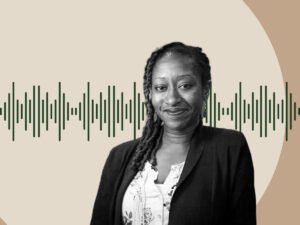
The Climate Funders Justice Pledge calls upon the top 40 funders in the United States to increase their funding of BIPOC-led organizations to at least 30 percent of their portfolios within the next two years. Started in 2021 by the Donors of Color Network, it also asks for transparent reporting of their grants and follow-through on philanthropic pledges made to BIPOC-led organizations. The Kresge Foundation is just one of the funders to get on board. They’ve supported the critical climate justice work of various BIPOC-led organizations, including the Deep South Center for Environmental Justice and Partnership for Southern Equity.
The Right to Be Free from Environmental Harm
The Deep South Center for Environmental Justice (DSCEJ) works toward equity and justice in environmental, energy, and climate policies. Founded in 1992 by Dr. Beverly L. Wright, DSCEJ is trying to create a future where everyone has the right to be free from environmental harm. Through research over the years, the organization has shown how environmental harm impacts health, housing, jobs, education, and its persistence throughout communities of color along the Mississippi River Chemical Corridor—also known as Cancer Alley, or sometimes Death Alley—and the broader Gulf Coast Region.
Born and raised in New Orleans, Dr. Wright has witnessed and experienced the harmful effects of Cancer Alley, an 85-mile stretch of land between New Orleans and Baton Rouge, LA, home to over 150 petrochemical refineries and plants. To help visualize the magnitude of the problem, DSCEJ created maps in 1990 that highlight the correlation between harmful industrial facilities, the pollution they produce, and the location of most communities of color.
Recently, the DSCEJ released an updated map. Despite the movement’s progress over the last 30 years, the map shows the danger polluting facilities continue to pose to communities of color—and that is only increasing in Cancer Alley, according to Dr. Wright.
“There are 170 facilities that report toxic chemicals, and 149 report greenhouse gas emissions with 29 facilities proposed or under construction—all in majority Black communities,” Dr. Wright said. “Additionally, 80 percent of Black people living in the Corridor live within three miles of multiple polluting facilities. Our people are inundated.”
But she has deeper personal connections to this work, involved not just as an advocate or scholar but as a Black mother and decades-long resident of New Orleans. To that end, Dr. Wright has set out to change environmental racism and policies that favor the gas and oil industries over the wellbeing of Black families and children.
Addressing Climate Change Through Racial Equity
Dr. Wright described climate change through the lens of racial equity as “a hefty fight in itself.” This, in part, inspired the creation of the Gulf Water Justice Project. In collaboration with the Barbara Jordan–Mickey Leland School of Public Policy at Texas Southern University (TSU), the project recognizes “that communities along the Gulf Coast Region are collectively exposed to but uniquely challenged by climate change.”
Knowing that the effects of climate change will be most severe for predominantly low-wealth and African American communities, the project ensures that these communities can participate in managing their public water systems. Human health is closely tied to these water systems as they provide drinking water, monitor groundwater usage, and divert or drain flood water. The Kresge Foundation supports the education and research skills training that has helped develop solutions to severe flood risks in these areas.
Intersectional Partnerships for Change
Nathaniel Smith, the chief equity officer at Partnership for Southern Equity (PSE), said that he’s seen more organizations having frank conversations about racial equity in recent times.
“The last three years exposed a lot of things, especially systems, structures, and outcomes of decisions that were made—and are still being adopted—by people in power who benefit from extreme extraction to the detriment of Black people and other marginalized populations,” Smith said. “As a result, our outreach has grown tremendously, and we are receiving more requests to come to the table and bring our leadership…to further more of these conversations.”
“The future of our people and planet are inextricably linked.”
PSE’s work is to advance institutional actions and policies that promote racial equity and shared prosperity for all in the growth of metropolitan Atlanta, GA, and the American South. Kresge’s support has allowed PSE to continue to impact communities through a cross-disciplinary coalition between their Just Energy and Just Health teams. Just Energy focuses on organizing marginalized communities against the harmful sourcing and commodification of power generation in Georgia. Just Health provides equity expertise and technical assistance for 11 rural communities to plan, develop, and implement strategies to improve access to healthcare resources.
“This coalition identified partners from a variety of other sectors to develop community-based multiyear work plans that address the intersection of climate change, health and equity; and develop systemic processes that create opportunities for energy equity, health equity and economic inclusion,” Smith explained. “The future of our people and planet are inextricably linked.”
Sign up for our free newsletters
Subscribe to NPQ's newsletters to have our top stories delivered directly to your inbox.
By signing up, you agree to our privacy policy and terms of use, and to receive messages from NPQ and our partners.
As a leader at PSE, he knows that it is a challenge for BIPOC-led groups to have a seat at the table when it comes to issues that directly affect communities of color, including climate action. “It is unequivocally false to assume that environment and climate are [not] traditional Black issues,” he said. “Our economy is based on extreme extraction, White oppression, and structural racism—those are true, historical, undeniable facts. The energy of enslaved people was usurped to build Georgia long before processes were developed to harness electricity.” Smith sees the importance of having policies and programs where Black people are seen, heard, and respected when discussing real solutions.
Working Together for Climate Solutions
In the last two years, the Network has been able to increase its funding pool to $120 million and is continuing to expand its funders.
DSCEJ and PSE were among the organizations that developed the idea for the Justice40 Accelerator program unveiled by the Biden-Harris administration. Justice40 Accelerator aims to aid climate and environmental justice organizations in accessing government funding to implement community-led solutions to their problems.
“It has radically reimagined the existing government resource delivery system as a restorative and reparative framework that marks a fundamental change in how the federal government works to address ongoing and historical economic, racial, and environmental injustices as well as the climate crisis,” Smith said. “This will only be successful if we continue to hold the presidential administration accountable to Justice40’s promises.”
Accountability is just one missing puzzle piece for BIPOC-led organizations receiving adequate funding in the climate space. Still, the Climate Funders Justice Pledge is helping the field make progress. In the last two years, the Donors of Color Network has been able to increase its funding pool to $120 million and is continuing to expand its funders.
The Future of Climate Justice
DSCEJ and PSE, now beneficiaries of Kresge’s commitment to the Climate Justice Pledge, look forward to being catalysts of transformation focusing on community building, improving the health of their community members, and, overall, protecting the planet. As they look to the future, the organizations have similar goals but take distinctive routes.
According to Dr. Wright, DSCEJ will set its sights on carbon capture and storage technology and the issues that come along with it. She explained that carbon capture is one of the biggest threats to their mission of ensuring that communities of color do not continue to be harmed by polluting industries.
“The change we seek exists within us.”
“Millions of pounds of toxic chemicals are pouring out of smokestacks that cause miscarriages, cancer, respiratory ailments, and other serious diseases. Local residents have no way of determining what is being released or how much,” Dr. Wright said. “We know CCS [carbon capture and storage] will only exacerbate this problem and we are fighting at state, local, and federal levels to defeat any proposal for this technology moving forward.”
In a neighboring state, PSE will host their first major summit devoted to racial equity. The Southern Unity for Racial Justice and Equity (SURJE) Summit will unite national partners, allies, and local communities to provide a space for dialogue, problem-solving, learning, and healing. According to Smith, everyone should have equal access to opportunities, resources, and a voice in the decision-making process.
Through the Climate Justice Funders Pledge, funders like the Kresge Foundation have an additional layer of accountability in supporting community-based, equity-driven responses to climate change. Ultimately, Smith said, the resources need to find their way to the people who have historically been marginalized.
“How do we advance economically, politically, socially, and educationally without substantively addressing conditions that are predicated on values and reinforced by systems founded on our devaluation as people?” Smith asked. “The change we seek exists within us.”












